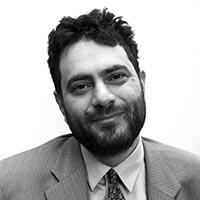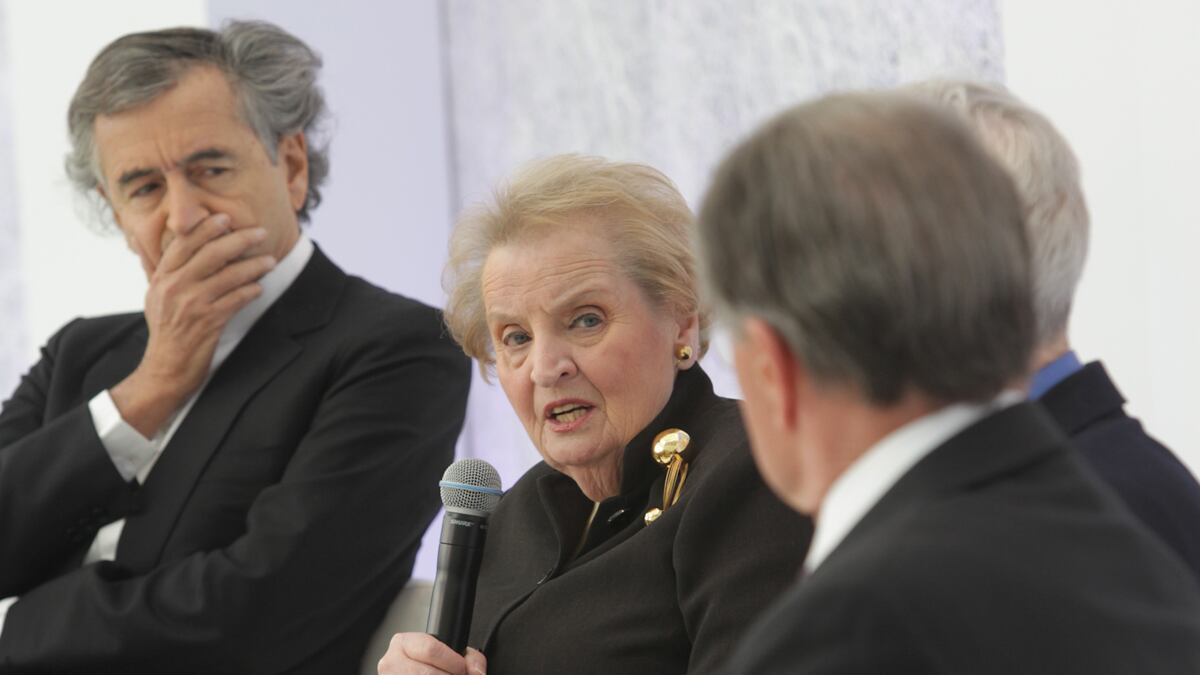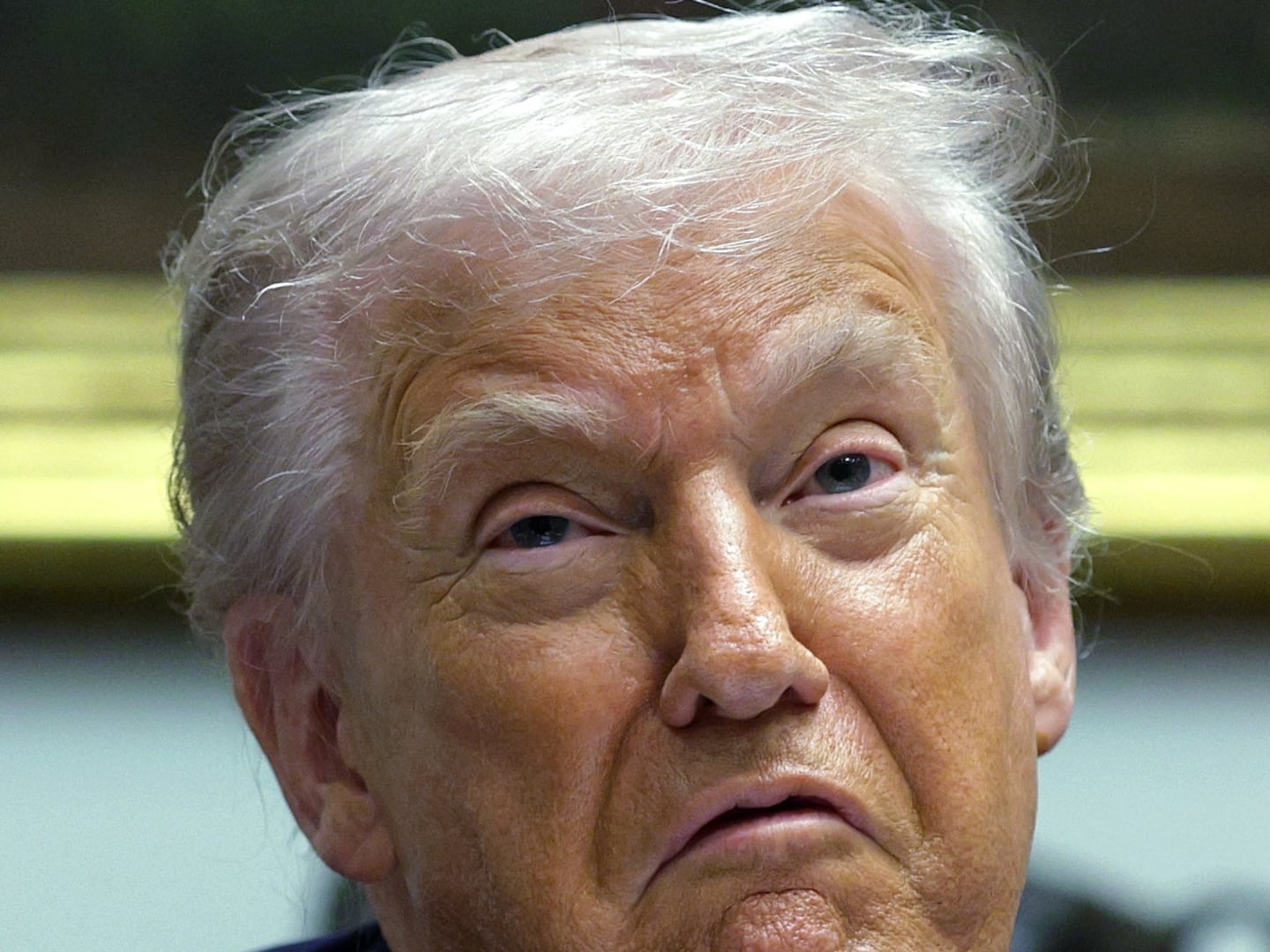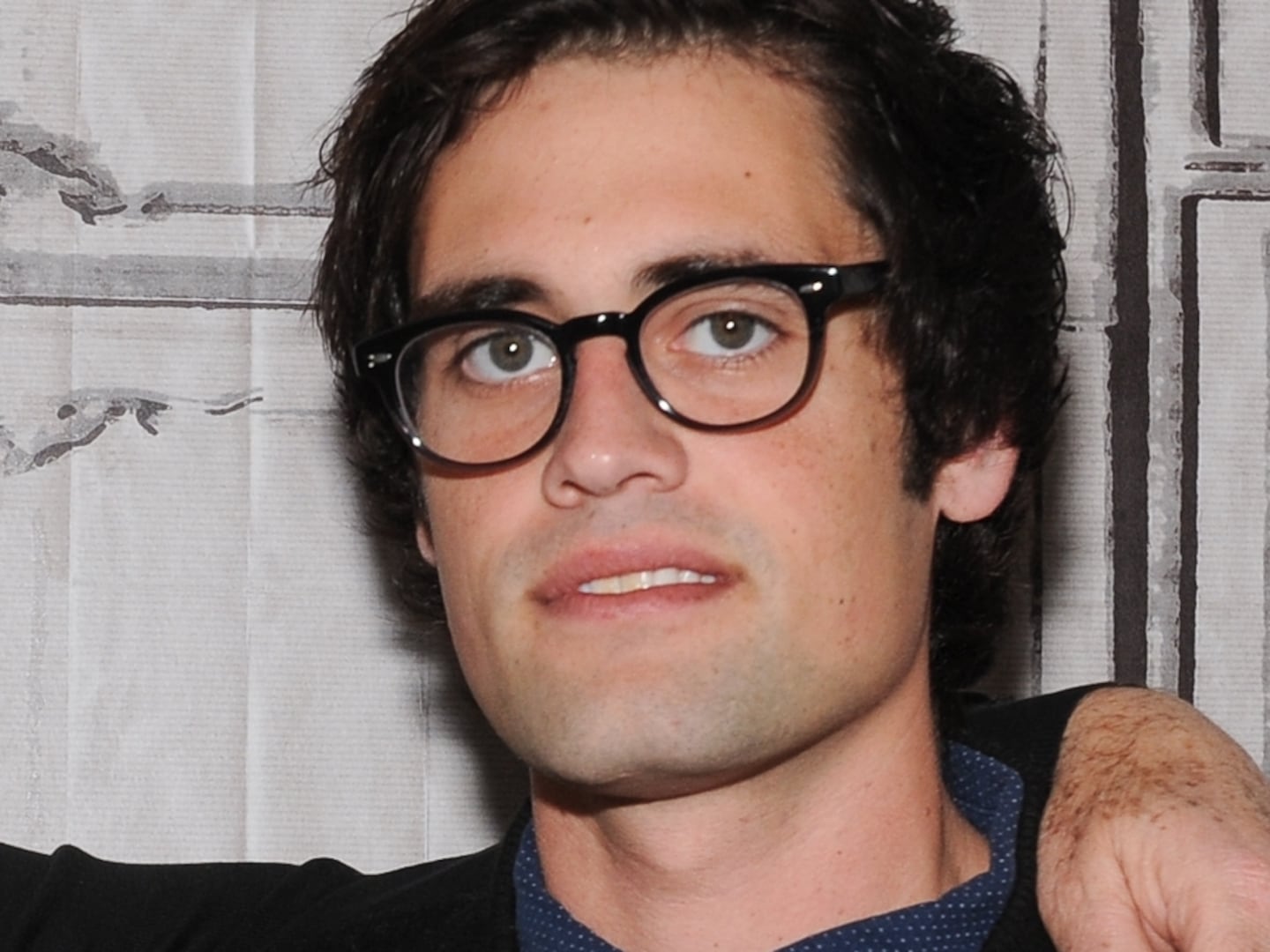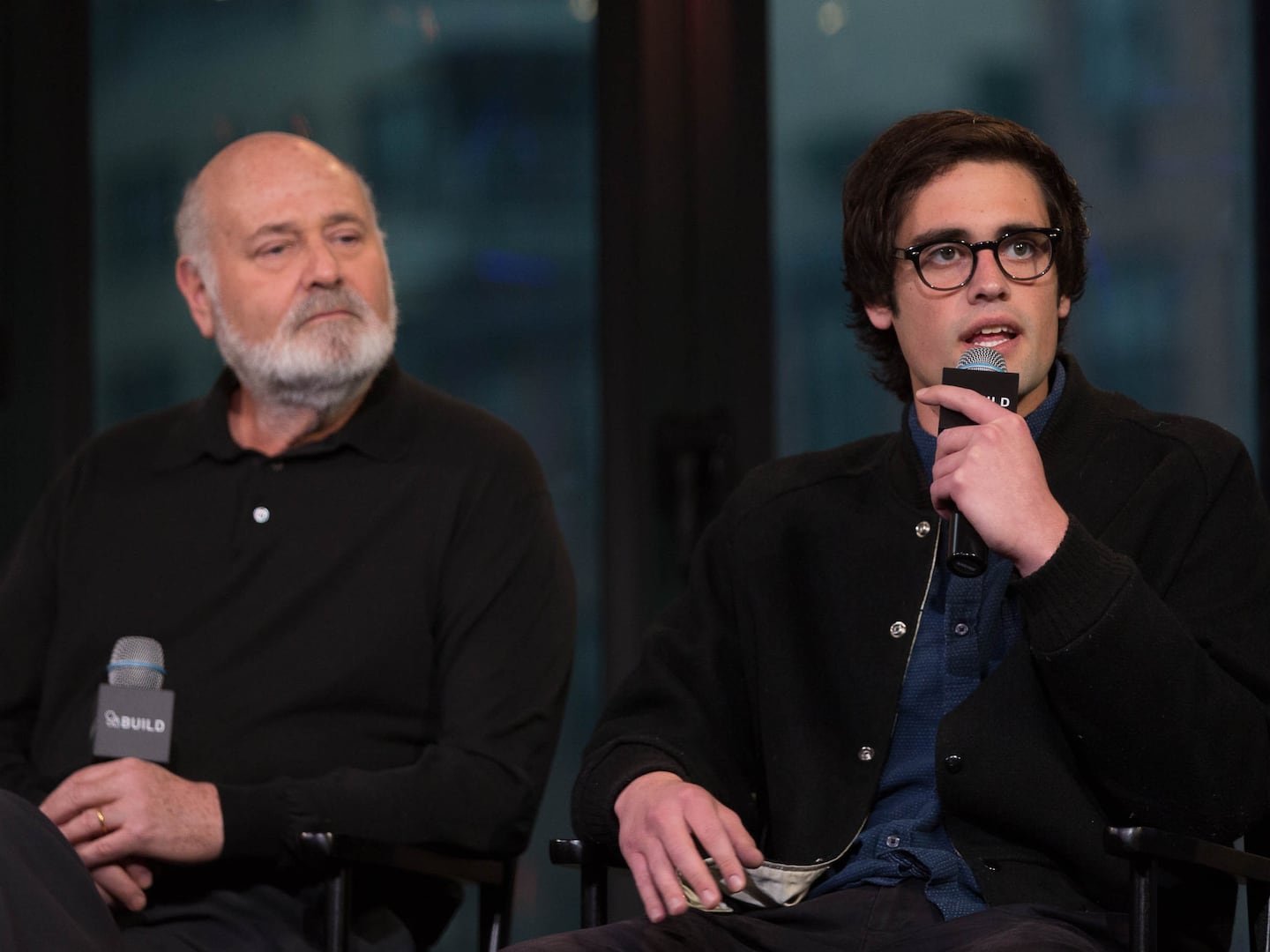The recorded voice of U.S. Ambassador to Libya Christopher Stevens, who was murdered in the Sept. 11, 2012, assault on the American consulate in Benghazi, provided a somber opening to the Diplomats on the Front Lines panel at Newsweek & The Daily Beast’s Hero Summit. In the tape, Stevens introduced himself as the newly freed nation’s ambassador.
Two of Stevens’s colleagues, former Secretary of State Madeleine Albright and veteran ambassador Ryan Crocker, were joined by public intellectual, philosopher, and activist Bernard-Henri Lévy in paying tribute to their fallen friend as they discussed the need in the uncertain, post–Arab Spring world for diplomats with the drive and courage to work “outside the walls” of the embassy.
"No American diplomat knew Libya better than Stevens did," said Crocker, who served as the U.S. ambassador to Afghanistan, Iraq, and Pakistan over the past decade, pointing to the two years Stevens served as ambassador to the opposition in Libya before the death of Col. Muammar Gaddafi, one of the signature moments in the Arab Spring. “Chris was one of our very finest officers, fluent in Arabic. He knew the regions, and he knew the dangers.”
“It's very hard to be an ambassador behind the walls,” Albright said. She called Stevens, a career diplomat who worked at State when she was its first female secretary, “the kind of person we need to have…Chris wanted to get out from behind the walls and represent the U.S. in difficult places—to be the eyes and ears of the president and the American people.”

Lévy, who came to Libya to work with, advocate for, and report on the rebels during their struggle with Gaddafi, recalled his time with Stevens during the nation’s civil war, when despite the risk, “we stopped in many cafés, many little spots because he wanted to mingle, to speak, to go to the real population—to speak with Syrians, speak with women."
“I think history will be written one day of the role of Ambassador Stevens in this war,” Lévy said, recalling a discussion with the Libyan opposition where he and Stevens called on them “to open a new front in the mountains…and Ambassador Stevens was so convincing, so eloquent” he carried the issue. “It was his taste and his will to be free.”
And Lévy raised a tragic comparison, noting that Stevens’s death came "10 years nearly to the day after another American hero who had the same pattern of mind as him, who was Daniel Pearl. Pearl and Ambassador Chris Stevens shared the same respect for other faiths, shared the same will to establish bridges in order to avoid clash of civilizations and the tragic, tragic thing…both of them these true American heroes died because of that."
Joking grimly, Crocker said his best quality as an ambassador was his “inherent expendability: ‘We'll ship out here and if it works great, if it doesn't work, it's no great loss.’” That, he said, was the job. “The Foreign Service at its best moves to the sound of the guns. You move to the fight because the fight is where our national security is decided.” He added: “After a while you kind of get to be a crisis junkie and anything else is boring.”
Stevens, said Crocker, knew that “the revolt against Gaddafi came out of Benghazi…and for us to understand and influence it, that was where you had to be—even if you knew it came with attendant risks.”
But, he said, managing risk—and accepting necessary danger—is essential. “I found over the years as a general rule that when the rockets are coming over the walls it’s probably a good idea to wait until they’re not—and then go out and see where they came from.”
He recalled, smiling, that when he was “Serving Secretary Albright, the [Syrian] embassy was attacked by a mob and my residence was completely ransacked and she made me stay there anyway.” Albright jumped in: “I did come to visit.”
Albright recalled that “when I was SoS we had a horrible set of events happen—our embassies in Kenya and Tanzania were blown up, something we thought we had guarded against…The embassy was in the middle of town, mostly glass, and there were questions of how security was employed.” She recalled the daily warning cables, reporting an unidentified Vespa outside of an embassy, and asking if should be closed, saying, “Those decisions are made by professionals.”
In the aftermath of the Benghazi attack, she recalled flying to the embassy in El Salvador, where “there was a helicopter pad, inside walls…and it's very hard to conduct business in that particular way… there really are issues how one carries on in the 21st century in these kind of conditions when you need to get your ambassadors out and have them fulfill their roles.”
“You have other people’s lives in your hands, you do have to make sure that the responsibilities are carried out right, but you also have to argue with the ambassador who says, ‘I don’t want to sit inside these walls…I want to get out there’—so it’s a much more complicated thing.”
Both Albright and Crocker warned that the Arab Spring had created a less stable and predictable foreign-policy picture for the U.S., and Crocker seemed to signal that he was dubious about the prospect of a stepped-up American role in the ongoing Syrian civil war—warning “how complex and difficult Syria is even compared to Libya.”
“I’ve learned a few basic truths in my years in the service. One of them is be careful what you get into,” Crocker said. “Intervention has consequences that can be very, very deadly. So you’ve got to start with knowledge. We need a better handle as an international community with what’s happening in Syria. Who are these guys in the opposition? Who supports them?”
He added, “We Americans have a tendency to say, ‘Oh, God, just do something.’ Well just doing something can get you in a world of hurt.”
Albright warned the Arab Spring—or Arab Awakening, or Arab Troubles, or Arab Opportunity, as it has also been deemed—“is more complicated than meets the eye” and needs a long-term “partnership with other countries for the long work [of creating] economic and political development.” She added, “Americans are the most generous people in the world—with the shortest attention span.”
In the Arab world, there are “terrible dangers going on, societies—the religious aspect is there, there is disquiet, disorder, nonstate actors. And yet the international community has to do something, and what we have to have is responsible ambassadors and people to provide us with information…Diplomats used to be able to go to the patisseries and people think of diplomats in striped pants and stuff and they don’t do that—they’re out there now working like dogs.”
Returning to Stevens, Crocker said that the essential information and intelligence the foreign service provides can’t be collected without men and women willing to put themselves in harm’s way to do their jobs.
“It really counted in Libya and Benghazi. It counts very much today in Afghanistan and Iraq. And brother does it count in Syria,” Crocker said. “We have to take the risk...We have to be prepared as a foreign service to take those risks, because what we can learn on the ground can save countless lives…And if some of us pay the ultimate price, that's simply part of the life.
“If it’s risk avoidance, there’s no point in being there. You have to take a calculated chance if you are going to serve the interests of this country in an increasingly volatile and uncertain world—and the Arab Spring is showing how volatile and uncertain it is.”
